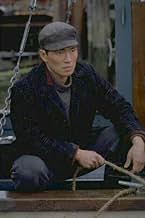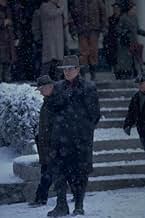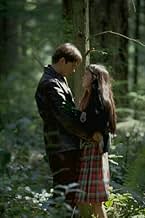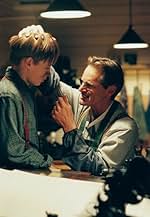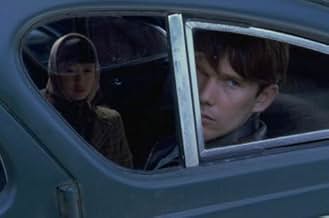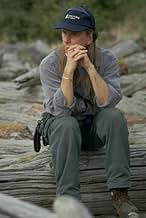IMDb RATING
6.7/10
15K
YOUR RATING
A Japanese-American fisherman is accused of killing his neighbor at sea. In the 1950s, race figures into the trial. So does reporter Ishmael.A Japanese-American fisherman is accused of killing his neighbor at sea. In the 1950s, race figures into the trial. So does reporter Ishmael.A Japanese-American fisherman is accused of killing his neighbor at sea. In the 1950s, race figures into the trial. So does reporter Ishmael.
- Nominated for 1 Oscar
- 5 wins & 11 nominations total
Max von Sydow
- Nels Gudmundsson
- (as Max Von Sydow)
Yûki Kudô
- Hatsue Miyamoto
- (as Youki Kudoh)
Daniel von Bargen
- Carl Heine Sr.
- (as Daniel Von Bargen)
- Director
- Writers
- All cast & crew
- Production, box office & more at IMDbPro
Featured reviews
This film stands apart from the standard, sometimes clever, seldom memorable work that passes too often for Oscar fare nowadays. It is a film about life and death, love and betrayal, passion and pain, forgiveness and redemption. It is about the power of emotion to influence perception and memory. It is about justice and truth.
But that is not why you should see it; You should see it for the story. For this film is so finely crafted, and the story unfolds so naturally, that it is easy to appreciate for the simple compelling drama of the narrative. You care about the characters, you care about how the trial turns out, and you ache to know the truth.
The plot centers around a murder trial of a Japanese man charged in the death of a local fisherman, and on a white reporter covering the trial. It turns out the reporter had once been in love with a Japanese woman, now the accused man's wife. This romance was shattered as World War II broke out, and the young woman and her family were rounded up with other Japanese Americans, and interred in camps.
The story that unfolds is part "Casablanca", part "Amistad", part "To Kill a Mockingbird", yet wholly original and true to itself. It is at once a tender love story, a lesson in history, a murder mystery, and more.
The story of each of the main characters is told through flashbacks that reveal how each of them has suffered because of the war and how each has to overcome this suffering. Many of the most compelling images of the film occur in these flashbacks. Like real lasting memories, they are moments of deep emotional significance, and include many images which you will carry in your own mind long after you have left the theater.
If you look for them you may also find some symbolic or allegorical images in the film (the boat's mast resembles a cross; the fish could also be seen as a Christian symbol of sacrifice), but these elements are not heavy handed or forced, they occur naturally as important elements of the story which is set in a small fishing village on the Northwestern coast of the US in the years surrounding World War II.
While I have seen many reviewers comment on how beautifully filmed and well acted this film is, I have seen a few who have somehow failed to appreciate the significance of the story. My only caution on this account is, take care that you are not so blinded by beauty, that you fail to notice love.
In short, I found this to be a brilliant, deep, uplifting engrossing, and highly satisfying film experience.
But that is not why you should see it; You should see it for the story. For this film is so finely crafted, and the story unfolds so naturally, that it is easy to appreciate for the simple compelling drama of the narrative. You care about the characters, you care about how the trial turns out, and you ache to know the truth.
The plot centers around a murder trial of a Japanese man charged in the death of a local fisherman, and on a white reporter covering the trial. It turns out the reporter had once been in love with a Japanese woman, now the accused man's wife. This romance was shattered as World War II broke out, and the young woman and her family were rounded up with other Japanese Americans, and interred in camps.
The story that unfolds is part "Casablanca", part "Amistad", part "To Kill a Mockingbird", yet wholly original and true to itself. It is at once a tender love story, a lesson in history, a murder mystery, and more.
The story of each of the main characters is told through flashbacks that reveal how each of them has suffered because of the war and how each has to overcome this suffering. Many of the most compelling images of the film occur in these flashbacks. Like real lasting memories, they are moments of deep emotional significance, and include many images which you will carry in your own mind long after you have left the theater.
If you look for them you may also find some symbolic or allegorical images in the film (the boat's mast resembles a cross; the fish could also be seen as a Christian symbol of sacrifice), but these elements are not heavy handed or forced, they occur naturally as important elements of the story which is set in a small fishing village on the Northwestern coast of the US in the years surrounding World War II.
While I have seen many reviewers comment on how beautifully filmed and well acted this film is, I have seen a few who have somehow failed to appreciate the significance of the story. My only caution on this account is, take care that you are not so blinded by beauty, that you fail to notice love.
In short, I found this to be a brilliant, deep, uplifting engrossing, and highly satisfying film experience.
As the referees say on pro football TV games, "On further review......" That's the way I thought after my second viewing of this movie.
GOOD NEWS - On the first look, I was totally blown away and dazzled at the fabulous cinematography. Man, this is one of the prettiest movies I've ever seen.....and that's important for my entertainment. Scene after scene looks like some picture postcard. I also enjoyed the two lawyers in this film, played by James Rebhorn and Max VonSydow. Sometimes those two were riveting to watch.
BAD NEWS - Most of the story was anything but riveting, way too slow and with way too much time used on flashbacks. This story could have been told in a much more presentable way which could have kept the audience's attention. It's also a little too politically-correct. We were beaten over the head with the prejudice against Japanese. Everyone here, except the Liberal newspaper editor and his son, is portrayed as extremely bigoted.
Overall, a spectacular visual film - one of the best ever - but a story that takes interminably long to tell.....too long.
GOOD NEWS - On the first look, I was totally blown away and dazzled at the fabulous cinematography. Man, this is one of the prettiest movies I've ever seen.....and that's important for my entertainment. Scene after scene looks like some picture postcard. I also enjoyed the two lawyers in this film, played by James Rebhorn and Max VonSydow. Sometimes those two were riveting to watch.
BAD NEWS - Most of the story was anything but riveting, way too slow and with way too much time used on flashbacks. This story could have been told in a much more presentable way which could have kept the audience's attention. It's also a little too politically-correct. We were beaten over the head with the prejudice against Japanese. Everyone here, except the Liberal newspaper editor and his son, is portrayed as extremely bigoted.
Overall, a spectacular visual film - one of the best ever - but a story that takes interminably long to tell.....too long.
Snow Falling on Cedars
Nominated for best cinematography, this film deserved to give American Beauty a better run for its money. Sadly savaged by many critics, who seemed to fail to grasp the depth of the story and the beauty with which it was told because they were too busy analyzing the parts. Snow Falling on Cedars follows a mixed race love that is complicated by the onset of war. The reactions of the two principle characters betrays not only how human love can transcend itself into something greater but how those involved can find fulfillment in themselves through its sacrifice. The exquisite symbolism (you could write a book on the different things snow could symbolize after watching this) is never overplayed - in other words, the viewer can enjoy the film as entertainment without having "deeper meanings" rammed down their throat - but they are there in abundance, from the way the scenery is developed to small details such as the main character's name ("Ishmael" - meaning "He whom God hears").
Nominated for best cinematography, this film deserved to give American Beauty a better run for its money. Sadly savaged by many critics, who seemed to fail to grasp the depth of the story and the beauty with which it was told because they were too busy analyzing the parts. Snow Falling on Cedars follows a mixed race love that is complicated by the onset of war. The reactions of the two principle characters betrays not only how human love can transcend itself into something greater but how those involved can find fulfillment in themselves through its sacrifice. The exquisite symbolism (you could write a book on the different things snow could symbolize after watching this) is never overplayed - in other words, the viewer can enjoy the film as entertainment without having "deeper meanings" rammed down their throat - but they are there in abundance, from the way the scenery is developed to small details such as the main character's name ("Ishmael" - meaning "He whom God hears").
This movie is based on the book of the same name by author David Guterson. It is *highly* recommended to read the book before watching this movie as, in the opinion of this reviewer, the movie is an unintelligible mess that leaves out vitally important material to the understanding of the plot.
While it is not always possible to retain the feeling and spirit of a work of fiction through the screenplay writing process, I believe that this is one case in which the screen writers failed to capture the essence of the characters and what the author was trying to impart, despite the fact that Mr. Guterson was involved in the process.
Even though the movie departs from book in several vital area's that drastically change the symbology and moral of the story, the cinematography in this movie is splendid; it captures a feeling of 1950's Americana in very convincing fashion and by itself, this imagery brings much of the feeling of time home to the viewer in a real and emotionally dramatic sense.
It is really too bad that more was not done to preserve the beautiful symbology of the book and, though it must be a difficult task, that the essence of the characters was not more carefully interpretted in a true-to-the-book fashion. The director comments that he was not attempting a very literal translation, and in this I think he makes a rather grave mistake and ends up doing both the movie and the story a disservice.
Again, I highly recommend reading the book before watching this movie, even though it might take away from your appreciation of the cinematography as you struggle to reconcile the directors choices with the authors obvious intended meaning.
While it is not always possible to retain the feeling and spirit of a work of fiction through the screenplay writing process, I believe that this is one case in which the screen writers failed to capture the essence of the characters and what the author was trying to impart, despite the fact that Mr. Guterson was involved in the process.
Even though the movie departs from book in several vital area's that drastically change the symbology and moral of the story, the cinematography in this movie is splendid; it captures a feeling of 1950's Americana in very convincing fashion and by itself, this imagery brings much of the feeling of time home to the viewer in a real and emotionally dramatic sense.
It is really too bad that more was not done to preserve the beautiful symbology of the book and, though it must be a difficult task, that the essence of the characters was not more carefully interpretted in a true-to-the-book fashion. The director comments that he was not attempting a very literal translation, and in this I think he makes a rather grave mistake and ends up doing both the movie and the story a disservice.
Again, I highly recommend reading the book before watching this movie, even though it might take away from your appreciation of the cinematography as you struggle to reconcile the directors choices with the authors obvious intended meaning.
Adapting this novel with its tricky, time-shifting narrative was always going to be a big task, but Scott Hicks' sumptuous and elegant film very nearly pulls it off. Hicks and co-writer Ron Bass move quickly into the courtroom and wisely use the trial to drive the plot, telling the backstory - the real story in this case - through a finely-woven complex of flashbacks. The difficulty is that this story is a rich, long and emotional tale which requires a fair degree of exposition for it to be satisfying. The screenplay is superbly economical in this regard, but there is no escaping the fact that the only way to cover so much ground in a film of tolerable length is to fly over it at 30,000 feet. The necessarily distant treatment this requires occasionally dilutes the emotional force which would have come from a more thorough and leisurely telling. Hicks strives valiantly to compensate with a powerfully emotive score - this works, but it doesn't always hit the mark. Rather than engendering emotion, James Newton Howard's musical is often so insistently overpowering that it locks the audience out. On occasions I felt strangely alienated by a wall of sound when I knew I should have been in tears. But that's a minor flaw in an otherwise excellent production. Overall, this is an intelligent and considered adaptation - probably the best that could be made from a novel which would have been incredibly difficult to bring to the screen. It's solidly acted, immaculately lit, and offers some of the most achingly beautiful imagery to illuminate the screen in years (the opening shots are magnificent). Most rewarding of all is the fact that Scott Hicks takes some real stylistic risks with this film. They don't always pay off, but when they do it's magical.
Did you know
- TriviaWhen the Japanese-Americans are sent to internment camps, many of the extras were Japanese-Americans who had actually been sent to the camps in the 1940s.
- GoofsJapanese guests wear black ties at the wedding. They should be wearing white ties. In Japan, black ties are for funerals.
- Quotes
Nels Gudmundsson: It takes a rare thing, a turning point, to free oneself from any obsession. Be it prejudice or hate, or, even love.
- Crazy creditsJan Rubes and Sheila Moore are on the credits despite their scenes being deleted.
- SoundtracksMoon over Burma
Written by Friedrich Hollaender (as Frederick Hollander), Frank Loesser
Performed by Dorothy Lamour
Courtesy of the RCA Records Label of BMG Entertainment
- How long is Snow Falling on Cedars?Powered by Alexa
Details
- Release date
- Country of origin
- Official sites
- Languages
- Also known as
- El Acusado
- Filming locations
- Production companies
- See more company credits at IMDbPro
Box office
- Budget
- $35,000,000 (estimated)
- Gross US & Canada
- $14,417,593
- Opening weekend US & Canada
- $32,135
- Dec 26, 1999
- Gross worldwide
- $23,049,593
- Runtime
- 2h 7m(127 min)
- Color
- Sound mix
- Aspect ratio
- 2.39 : 1
Contribute to this page
Suggest an edit or add missing content


